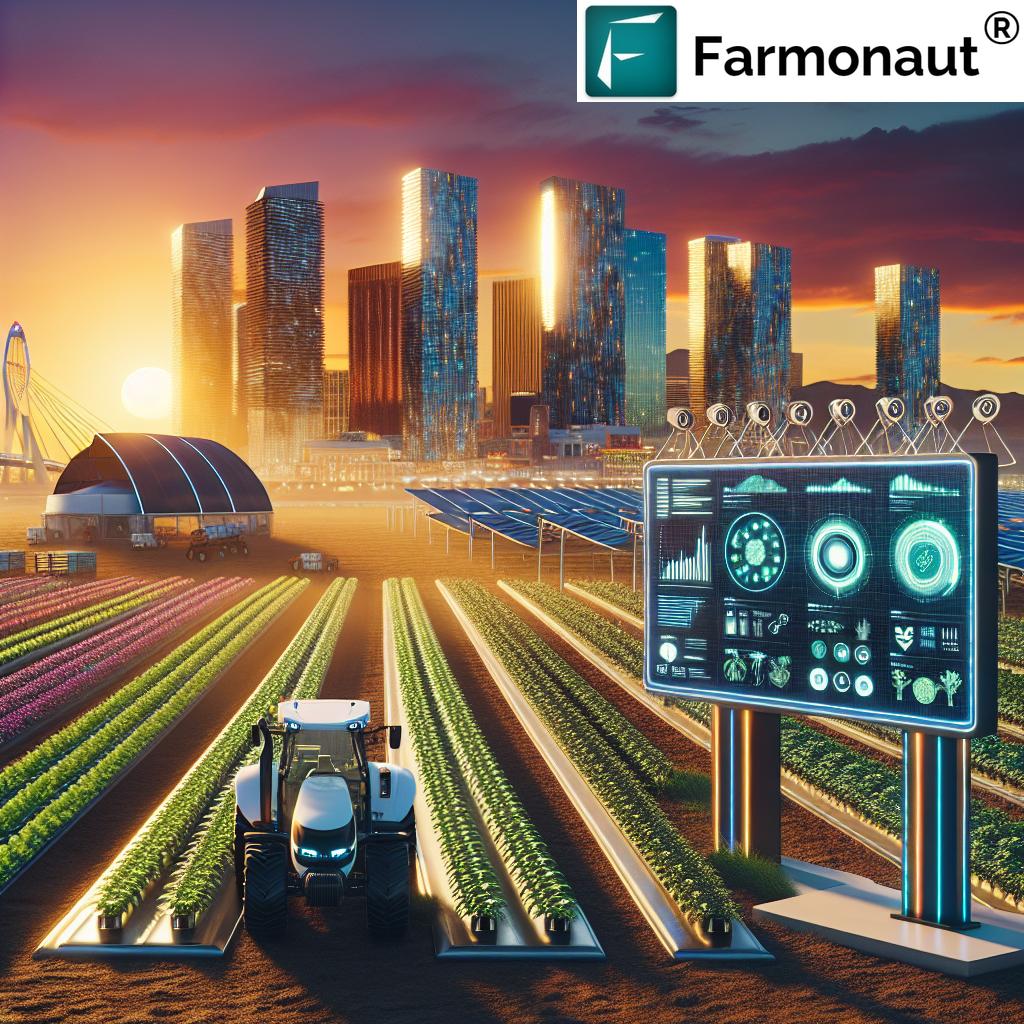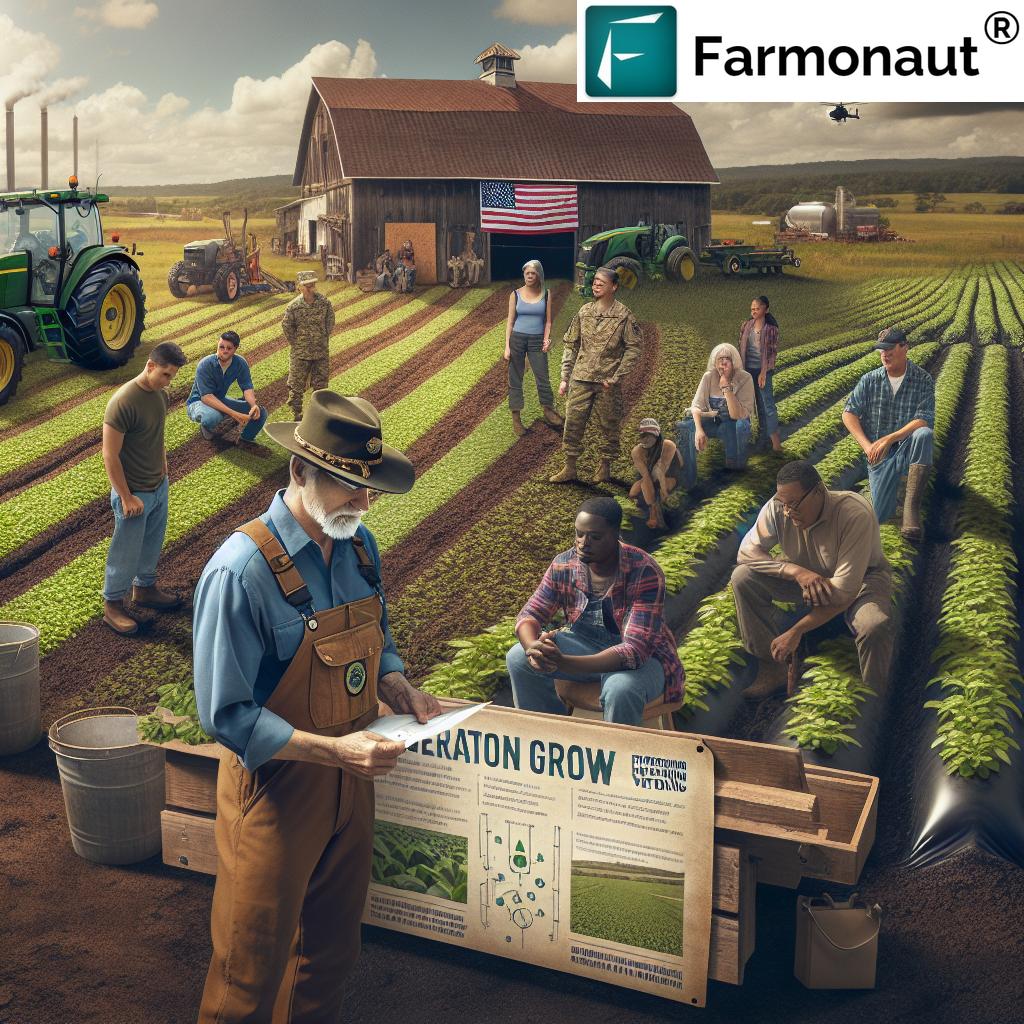Revolutionizing Las Vegas Agriculture: How AI and Autonomous Farming Equipment Are Solving the Labor Crisis
“The average age of farm producers has reached 58, highlighting the urgent need for agricultural automation.”
In the heart of the Mojave Desert, Las Vegas is not typically associated with thriving agriculture. However, the city and its surrounding areas are experiencing a quiet revolution in farming practices, driven by the pressing need to address a growing labor crisis. As we at Farmonaut observe the changing landscape of agriculture, we’re excited to explore how cutting-edge technology is transforming the industry in this unlikely oasis.
The Labor Crisis in Las Vegas Agriculture
Las Vegas, like many other regions across the United States, is grappling with a significant challenge in its agricultural sector. The average age of farm producers has steadily climbed, reaching a concerning 58 years old in 2022, according to the United States Department of Agriculture (USDA). This aging trend in the producer population has led to a critical shortage of skilled workers in the industry.
The implications of this labor gap are far-reaching:
- Reduced farm productivity
- Increased operational costs
- Challenges in meeting growing food demand
- Difficulties in implementing new farming techniques
As the farm workforce continues to age and fewer young people enter the field, the need for innovative solutions becomes increasingly urgent. This is where agricultural automation and autonomous farming equipment come into play, offering a promising path forward for Las Vegas farmers.
The Rise of Agritech Solutions in Las Vegas
In response to these challenges, Las Vegas is witnessing a surge in the adoption of agritech solutions and smart farming techniques. These innovations are not just addressing the labor shortage; they’re revolutionizing the entire agricultural landscape of the region.
Key technologies transforming Las Vegas agriculture include:
- AI-driven autonomous tractors
- Precision agriculture technology
- Drone-based crop monitoring
- IoT sensors for soil and climate data collection
- Robotic harvesting systems
These advancements are not only filling the labor gap but also enhancing efficiency, reducing resource waste, and improving crop yields. Let’s delve deeper into how these technologies are making a difference.
AI and Machine Learning: The Brains Behind Autonomous Farming
“AI-driven autonomous tractors can provide 360-degree field views using multi-camera systems, enhancing precision farming.”
Artificial Intelligence (AI) and machine learning are at the forefront of the agricultural revolution in Las Vegas. These technologies are enabling farming equipment to operate autonomously, making decisions based on real-time data and complex algorithms.

Here’s how AI is transforming farming operations:
- Autonomous Tractors: Equipped with advanced AI systems, these tractors can plow, plant, and harvest with minimal human intervention.
- Precision Planting: AI algorithms optimize seed placement, depth, and spacing for maximum yield.
- Intelligent Irrigation: Machine learning models analyze soil moisture, weather forecasts, and crop needs to deliver precise amounts of water.
- Pest and Disease Management: AI-powered image recognition systems identify early signs of pest infestations or crop diseases, allowing for targeted interventions.
The integration of AI in agriculture is not just about replacing human labor; it’s about augmenting human capabilities and making farming more precise, efficient, and sustainable.
Autonomous Farming Equipment: The Workhorses of Modern Agriculture
In Las Vegas, autonomous farming equipment is quickly becoming the backbone of agricultural operations. These machines are capable of working around the clock, performing tasks with a level of precision that surpasses human capabilities.
| Equipment Type | Key Features | Labor Hours Saved (Estimated %) | Efficiency Increase (Estimated %) | Resource Optimization |
|---|---|---|---|---|
| Autonomous Tractors | Multi-Camera Systems, GPS Navigation | 70% | 30% | Fuel reduction by 15% |
| AI-Driven Sprayers | Precision Nozzles, Real-time Weed Detection | 60% | 40% | Chemical usage reduced by 90% |
| Robotic Harvesters | Soft Grippers, Computer Vision | 80% | 50% | Crop damage reduced by 25% |
| Drone Crop Monitors | Multispectral Imaging, AI Analysis | 50% | 35% | Water usage optimized by 30% |
Let’s explore some of the standout autonomous equipment making waves in Las Vegas agriculture:
- Self-Driving Tractors: These machines use GPS and obstacle detection systems to navigate fields with precision, reducing operator fatigue and improving efficiency.
- Robotic Harvesters: Equipped with advanced sensors and gentle gripping mechanisms, these robots can harvest delicate crops like fruits and vegetables without causing damage.
- Autonomous Sprayers: Using AI and computer vision, these machines can identify weeds and apply herbicides with pinpoint accuracy, reducing chemical use and environmental impact.
- Drone Crop Monitors: These aerial vehicles provide real-time data on crop health, allowing farmers to address issues promptly and optimize resource allocation.
The adoption of these autonomous systems is not just solving the labor shortage; it’s elevating the entire farming process to new levels of efficiency and sustainability.
Precision Agriculture Technology: Maximizing Efficiency in Las Vegas Farms
Precision agriculture technology is playing a crucial role in optimizing farming operations in Las Vegas. By leveraging data-driven insights, farmers can make more informed decisions about every aspect of their operations.
Key components of precision agriculture in Las Vegas include:
- Satellite Imagery: High-resolution satellite data provides valuable insights into crop health and field conditions. Farmonaut’s satellite-based crop health monitoring is at the forefront of this technology, offering real-time vegetation health indices and soil moisture data.
- IoT Sensors: A network of sensors across fields collects data on soil moisture, temperature, and nutrient levels, enabling micro-management of growing conditions.
- Variable Rate Technology (VRT): This allows for precise application of inputs like water, fertilizers, and pesticides based on specific needs of different areas within a field.
- GPS-Guided Machinery: Ultra-precise positioning systems guide equipment, reducing overlap and improving efficiency in planting, spraying, and harvesting.
By implementing these precision agriculture technologies, Las Vegas farmers are seeing significant improvements in crop yields while reducing resource usage and environmental impact.
The Role of Farmonaut in Las Vegas Agriculture
At Farmonaut, we’re proud to be part of the agricultural revolution in Las Vegas. Our innovative platform integrates seamlessly with the emerging autonomous and AI-driven farming technologies, providing valuable insights and decision-making tools for farmers.

Our platform offers:
- Real-time Crop Health Monitoring: Using satellite imagery and advanced algorithms, we provide up-to-date information on crop health, helping farmers identify issues before they become problematic.
- AI-Powered Advisory System: Our Jeevn AI system offers personalized recommendations based on real-time data, weather forecasts, and historical trends.
- Resource Management Tools: We help farmers optimize their use of water, fertilizers, and other inputs, reducing waste and improving sustainability.
- Integration with Autonomous Equipment: Our platform can interface with various autonomous farming equipment, providing a centralized control and monitoring system.
By leveraging Farmonaut’s technology, Las Vegas farmers can make the most of their autonomous equipment and precision agriculture systems, further enhancing efficiency and productivity.
The Future of Farming in Las Vegas
As we look to the future, it’s clear that the integration of AI, autonomous equipment, and precision agriculture technology will continue to reshape Las Vegas agriculture. Here are some trends we anticipate:
- Increased Automation: More tasks will be automated, from planting to harvesting, reducing the need for manual labor.
- Data-Driven Decision Making: Advanced analytics and AI will play a larger role in farm management decisions.
- Sustainable Practices: Technology will enable more sustainable farming practices, reducing water usage and chemical inputs.
- Vertical Farming: In urban areas of Las Vegas, vertical farming could become more prevalent, leveraging AI and automation in controlled environments.
- Blockchain Integration: Technologies like Farmonaut’s blockchain-based traceability solutions will ensure transparency and food safety throughout the supply chain.
These advancements will not only address the labor shortage but also position Las Vegas as a leader in innovative, sustainable agriculture.
Overcoming Challenges in Adoption
While the benefits of AI and autonomous farming equipment are clear, there are challenges to widespread adoption in Las Vegas:
- Initial Costs: The upfront investment for autonomous equipment can be substantial.
- Technical Skills: Farmers need to develop new skills to operate and maintain advanced technologies.
- Regulatory Framework: Laws and regulations around autonomous farming equipment are still evolving.
- Data Privacy and Security: As farming becomes more data-driven, ensuring the security and privacy of farm data becomes crucial.
To address these challenges, collaboration between technology providers, agricultural organizations, and government bodies is essential. Education and training programs will also play a vital role in equipping farmers with the necessary skills to leverage these new technologies effectively.
Sustainable Farming Practices Enabled by Technology
The integration of AI and autonomous equipment is not just about efficiency; it’s also driving more sustainable farming practices in Las Vegas. Here’s how:
- Precision Resource Use: AI-driven systems optimize the use of water, fertilizers, and pesticides, reducing waste and environmental impact.
- Soil Health Management: Autonomous equipment can implement practices like no-till farming more effectively, preserving soil structure and reducing erosion.
- Energy Efficiency: Many autonomous machines are electric or hybrid, reducing the carbon footprint of farming operations.
- Biodiversity Preservation: Precision technologies allow for more targeted pest control, minimizing the impact on beneficial insects and wildlife.
By embracing these technologies, Las Vegas farmers are not only addressing the labor shortage but also contributing to more environmentally friendly agricultural practices.
The Economic Impact of Agricultural Automation in Las Vegas
The adoption of AI and autonomous farming equipment is having a significant economic impact on Las Vegas agriculture:
- Increased Productivity: Autonomous equipment can work longer hours, increasing overall farm output.
- Cost Reduction: While initial investments are high, long-term operational costs are reduced through efficient resource use and lower labor requirements.
- New Job Creation: The shift towards high-tech farming is creating new jobs in areas like agricultural technology, data analysis, and equipment maintenance.
- Economic Diversification: Advanced agriculture technology is helping to diversify Las Vegas’s economy, traditionally reliant on tourism and hospitality.
These economic benefits are helping to secure the future of farming in the Las Vegas area, ensuring that agriculture remains a viable and attractive industry for future generations.
Farmonaut’s Contribution to Las Vegas Agriculture
At Farmonaut, we’re committed to supporting the agricultural transformation in Las Vegas. Our platform provides crucial tools and insights that complement the use of autonomous equipment and AI in farming:
- Satellite-Based Crop Monitoring: Our advanced satellite imagery analysis helps farmers track crop health and make informed decisions.
- AI-Powered Recommendations: The Jeevn AI system offers personalized advice based on real-time data and historical trends.
- Resource Optimization: Our tools help farmers manage water, fertilizers, and other inputs more efficiently.
- Integration Capabilities: Farmonaut’s platform can integrate with various autonomous farming systems, providing a unified management interface.
We invite Las Vegas farmers to explore how Farmonaut can enhance their agricultural operations:
For developers interested in integrating our technology into their own systems, we offer comprehensive API access:
Conclusion: A New Era for Las Vegas Agriculture
The agricultural landscape in Las Vegas is undergoing a remarkable transformation. The integration of AI, autonomous farming equipment, and precision agriculture technology is not just solving the critical labor shortage; it’s ushering in a new era of efficient, sustainable, and productive farming.
As these technologies continue to evolve and become more accessible, we at Farmonaut are excited to be part of this journey, providing tools and insights that help farmers make the most of these advancements. The future of farming in Las Vegas is bright, promising increased productivity, improved sustainability, and new opportunities for innovation in agriculture.
FAQs
- How is AI changing agriculture in Las Vegas?
AI is revolutionizing Las Vegas agriculture by enabling autonomous equipment operation, providing data-driven insights for decision-making, and optimizing resource use through precision farming techniques. - What types of autonomous farming equipment are being used in Las Vegas?
Las Vegas farmers are adopting various autonomous equipment including self-driving tractors, robotic harvesters, autonomous sprayers, and drone crop monitoring systems. - How does Farmonaut support autonomous farming in Las Vegas?
Farmonaut provides satellite-based crop monitoring, AI-powered recommendations, and resource optimization tools that complement autonomous farming equipment, helping farmers make data-driven decisions. - What are the main challenges in adopting autonomous farming technologies in Las Vegas?
The main challenges include high initial costs, the need for new technical skills, evolving regulatory frameworks, and data privacy and security concerns. - How is agricultural automation addressing the labor shortage in Las Vegas?
Autonomous equipment can perform many tasks traditionally done by human workers, operating around the clock with high precision, thus helping to fill the gap left by the shortage of skilled agricultural labor.










